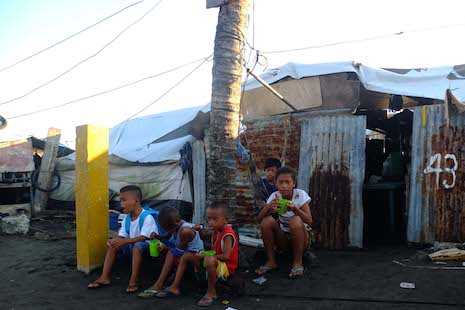
Children sit outside a tent in Leyte that serves as a shelter for typhoon victims. (Photo by Bobby Lagsa)
Displaced Typhoon Haiyan survivors have accused authorities in Leyte province of blocking efforts by international humanitarian groups to provide them with materials to build new shelters.
Families living in the town of Tanauan say the new typhoon season is fast approaching and that they face the daunting prospect of riding it out without having adequate shelter.
"While non-government organizations have been trying to provide shelter materials to those living in tents, the government seems to be taking steps to stop it," Benilda Barcilla, a resident of the nearby village of Sabang said on Wednesday.
"It's going to be storm season again, and the tents will not last. We want safer places to stay while waiting for a permanent relocation site," said Malyn Macacando, another resident.
City officials, however, say the survivors are living in a "no-build zone," land stretching 40-meters inland from the coast that has been declared disaster-prone.
But residents, many of whom are fishermen, said they have nowhere else to go because the city authorities have not provided them with a permanent relocation site.
The city government last week stopped distributing tin and corrugated iron sheets for roofing to prevent residents from constructing permanent housing structures in no-build zones.
These zones also apply to other areas in the storm-ravaged region and affect thousands of families.
Marissa Cabaljao, spokeswoman of People Surge, an alliance of typhoon survivors, said bureaucracy has deprived people of shelter.
"They have no place to go, there is no transition shelter, there is no relocation site," she told ucanews.com
Cabaljao said fishing communities in the province have been living near the coast for many years and removing them from their source of living is "unacceptable".
"It’s all these delays in providing shelters that put people in harm’s way," Cabaljao said.
Data from Shelter Cluster Philippines, which groups UN and international aid agencies helping Haiyan survivors, show that more than a million houses were destroyed by the typhoon last November.
Some 100,000 people remain in tents despite government efforts to build homes for survivors, the group says.
"We are working with aid agencies and local governments to fast-track permanent shelters for those displaced," said Nestor Ramos, regional director of the government's social welfare office.
"Our challenge is a combination of many factors. There is the large number of affected families left without shelter, and a lack of resources available to rebuild structures," Ramos added.
Conrad Navidad, emergency preparedness and response coordinator for the International Organization for Migration (IOM), a global humanitarian agency, noted a shortage of viable evacuation centers in areas hit by Haiyan.
"We urgently need to identify alternative evacuation centers," Navidad said.
The Philippines is one of the most disaster-prone countries in the world, suffering an average 20 typhoons each year.


